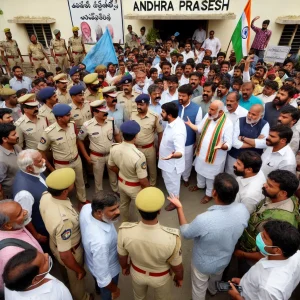
Amaravati: TDP chief and Andhra Pradesh Chief Minister Chandrababu Naidu (CBN) has directed that AC-level cadre meetings be conducted behind closed doors, barring public and media access. This move has sparked intense speculation and criticism, raising questions about what Naidu is trying to conceal from the people.
Growing Concerns Over Secrecy
Political analysts believe that Naidu’s decision to conduct closed-door meetings indicates deep-seated issues within the TDP and growing dissatisfaction among its ranks. The secrecy has led to key questions:
🔴 Is he hiding the government’s failures and rising public anger? The TDP-JSP-BJP alliance government has faced massive protests from various sections of society, including Group-2 aspirants, Anganwadi workers, Asha workers, teachers, farmers, and sanitation workers. Is this an attempt to avoid accountability?
🔴 Is he covering up corruption within TDP? Allegations of rampant corruption and favoritism within the administration continue to surface. The closed-door meetings could be an effort to prevent internal leaks and media scrutiny.
🔴 Is he silencing dissent within his own party? Reports suggest that many TDP leaders and cadre are unhappy with CBN’s leadership and decision-making, especially after recent electoral setbacks in MLC elections where government teachers voted against the alliance candidate.
Public Questions and Political Repercussions
This move raises serious concerns about transparency and governance. When a leader avoids public discourse and hides behind closed doors, it only fuels suspicion. Political observers argue that a government truly confident in its actions would not shy away from engaging with the people and the media.
As Andhra Pradesh faces increasing unrest, Naidu’s closed-door politics signals a lack of confidence in his administration. If this continues, it may deepen the disconnect between the government and the people, potentially leading to political consequences in the near future.




